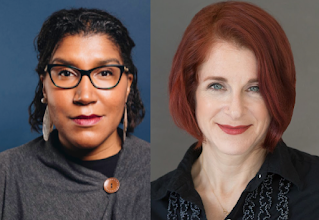In 1906, the Forward started A Bintel Brief, Yiddish for “A Bundle of Letters.” Now that classic Jewish advice column is a podcast. The co-hosts, two very different Jewish mothers, dish on the dilemmas of Jewish-American life, identity, culture and politics.
They have already completed a successful season one and are well into season two.
The co-hosts are Ginna Green and Lynn Harris.
Ginna Green is a strategist-consultant-movement-builder now helping Jewish (and other) organizations change through her new firm, Uprise. She is on the boards of progressive Jewish groups including Bend the Arc and the Jews of Color Initiative, and lives in Columbia, South Carolina, where she went to high school and college. Her interests include cooking, bourbon and annihilating her four children at Scrabble, even on Shabbat.
Lynn Harris is a writer-activist-multihyphenate who uses the power of comedy to drive change. She is founder of GOLD Comedy, co-creator of Breakup Girl, and a former advice columnist for Glamour and other print magazines of blessed memory. She enjoys hot sauce and embarrassing her teen children just by existing, and dedicates this gig to her late mother, who gave the best advice in the world.
We were able to talk with both Ginna Green and Lynn Harris about their podcast, A Bintel Brief.
Q. So, you took a column that began in 1906 and converted it to a podcast. That's a massive undertaking. Why a podcast? How did you get started with the podcast?
A. Bringing A Bintel Brief into the age of audio was part of Jodi Rudoren’s vision when she became editor of the Forward. When you think about the way the original column generated community and conversation—people shared the paper, passed it around, discussed—audio, along with everything else that tech can enable, feels like a natural, and not even so new-fangled fit. (LH)
Q. Ginna & Lynn, how did you transition your skills from print to podcasting?
A. Learning how to co-host a podcast? In my prior lives, I spent time in just about every medium–and radio was always my favorite. It might have had something to do with the fact that I could do an interview from my living room in my pajamas before it was pandemic protocol. So jumping in the podcast pool was right up my alley. (GG)
Q. How did you decide on the topics (letters) for season one? Did you have a sequence you wanted to follow for season one?
A. We selected letters that stood out for a nice balance of specificity and relatability, a strong emotional current, and for the opportunity to bring in a Jewish angle even if the questions weren’t about Judaism itself. (There’s always a way to bring in a Jewish angle.) We didn’t have a pre-planned sequence, but we did plan the flow to shift between lighter to heavier and to vary among topics. We did save a couple of heavier ones for later in the season, in part because we felt it was important to first build up trust among our listeners. (LH)
Q. What has been the audience's response to the podcast? Downloads? Listener feedback?
A.What’s fun is that listeners often respond not directly to us, but to the folks who wrote the letters—citing their own experiences and offering suggestions of their own. Again, it’s that sense of community and conversation that we can create, even without sitting around a table on the Lower East Side. (LH)
Q. What do you think is the answer to: My listeners come to the podcast to...?
A. Because Lynn and I are fun, and other people’s problems are way more fun than one’s own. But also because we are thoughtful and open-minded, non-dogmatic and curious. Sometimes we are lighthearted, and sometimes we are heavy, but we often have as many questions as we have answers, which is probably spot-on for a Jewish advice podcast. (GG)
Q. What's been the most rewarding feedback you've received from listeners so far?
A. One of our earliest episodes, “Mr. Not-Dad,” dealt with an older gentleman lamenting that he had never become a dad. We grappled with that reality, and then offered our letter-writer to not give up–there are so many ways to become a dad, or even a father figure, in a time of such change around family composition, structure and creation. A dear friend of mine, who shared perhaps some of the same feelings as Mr. Not-Dad if not the exact circumstances, was listening to the episode on a bike ride to the beach, and he had to stop and pull over to text me that the episode meant so much to him. And that meant so much to me. (GG)
******************
A Bintel Brief isn't simply an advice podcast, like say Dear Sugars, which is a good one. It also acts as a cultural reservoir, since the podcast reimagined a 116-year-old advice column in print into a podcast.
Unfortunately, we are in an age in the U.S. where having a cultural and ethnic identity and waving that flag seems to anger those who feel threatened by such displays of group pride and expression.
A Bintel Brief and its two charming and wise-beyond-their-years co-hosts skillfully answer these listener questions in every episode: Who am I? How do I relate to others in the Jewish-American community? How do I relate to others outside that community? How is my faith related to my lifestyle?

Comments
Post a Comment
Thank You for your input and feedback. If you requested a response, we will do so as soon as possible.